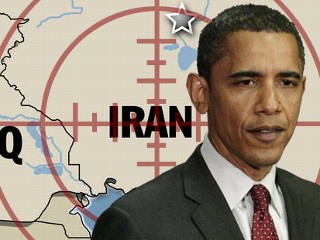
Obama, Iran, and the Race Against Time…
(Palestine) on 8 December 2008
by Ali Al-Shihabi (link to original)
Iran is a threat due to its studious efforts to become a regional power and to force the United States to share the wealth of the Gulf, something which any American administration will prevent by various means. For how can the United States permit this sharing, whilst only yesterday it was forcing others to share their wealth? That is why I believe that Obama must go down the road of removing all barriers that prevent the United States from burying the Iranian project, which is aimed at acquiring nuclear weapons. For this reason he will use a two-pronged strategy:
1. Refurbishing military strength and withdrawing from Iraq. Iraq is not stable, no doubt, and the American army is being drained to no avail. Iran is convinced that the threatening of an American military strike is only a threat of words and not action. But a withdrawal from Iraq would free the American army from the enemy environment it is in and allow it the freedom of movement. At the same time, it allows it to be redeployed to Afghanistan where it would make the NATO forces more effective in counteracting the Taliban and Al Qaeda, and when necessary, Iran. A withdrawal would also be aimed at applying pressure on Iran and to make it understand that a military option against it has become a serious consideration.
2: Working to mend the rift with Russia, by means of a practical apology for the Bush administration’s attempt to humiliate it. This will be done by reaching an understanding, and perhaps coordinating with Russia on the missile shield in Eastern Europe and recognizing regional interests. This is in addition to a number of incentives, such as bringing Russia into the World Trade Organization and supporting its negotiations with the European Union to reach an agreement of strategic participation between them.
No doubt Russia will generally welcome this type of cooperation with the United States. Its announcement, on the day after Obama’s election, of deploying a network of missiles to deal with the American missile shield was a way of seeing how Obama would deal with it. At the same time, it drew attention to its readiness to reach an understanding with him, especially on outstanding problems between Russia and the United States. What is not known is what the Obama administration would offer Russia as an enticement in return for its support in forcing Iran to abandon its nuclear program, or if Russia would accept it. What is certain is that Iran’s nuclear program will soon become a chip in Russia’s hand to bargain with the West. I believe Russia will lean in this direction, because it prefers to join the West on a completely equal basis with regards to its interests. What else would it want, as long as Russia is Russian, and not as the Arab and Islamic people fantasize?
In any case, if the Obama administration reaches an understanding with Russia on the Iranian nuclear program, then the “international community” will unite against Iran and use the carrot and stick approach with it: It will offer a basket of generous incentives in return for its abandoning the enrichment of uranium; the penalty would be to issue an international resolution placing an economic blockade on Iran. If it persists in enriching [uranium], then this resolution would be enacted, and that would mean preventing Iran from exporting oil and suspending commercial activity with Iran, even by countries such as the countries of the Persian Gulf.
Certainly, it is not in anyone’s interest to launch a military strike against Iran, because killing with a silk thread is softer, smoother, and more “humane” than killing with a knife, and it serves the same purpose. At the same time, by using that thread, the region could avoid a possible war started by Hezbollah against Israel, to defend itself more than to defend Iran. For what would Iran do if American and European warships, with the consent of Russia and China, began to seize Iranian oil tankers in the Gulf or even outside the Strait of Hormuz? Would it wage war on the world to close the Strait of Hormuz? Or would it launch a war to break the economic blockade, and against whom? Against Saudi Arabia and the countries of the Gulf or against Israel?
In any case, the American-European stick is not raised threateningly. No doubt Obama will earnestly endeavor to push matters in this direction, and he will do so quickly. I believe that for this reason, he has arranged a meeting between himself and the Russian president in the near-future, even before he is officially placed in office. Will Russia respond to these efforts, or will it continue to support Iran, at least by providing international cover for its nuclear program until it produces its first nuclear weapon, which will turn the tables on the new international relations that Obama is determined to forge?
Clearly, I haven’t even touched on what the Iranian leadership’s position would be if Russian reciprocated (to Obama’s overtures) what their position would be if Russia didn’t reciprocate. We have seen them deal with this issue with utmost rationality since its nuclear program was placed on the negotiating table in the days of President Khatami. At that time he announced, in complete candidness, “The West wants a boxing match where victory is delivered by a knockout punch, but we want a marathon race,” while Iran prepared for a storm. But after the extent of the American embroilment in Iraq was revealed, Iran stood firm as a spear in the face of that storm, because it was a storm of words. Then what would it do if Obama and Russia came to an agreement?
I think that depends on a simple equation in which one time interacts with another time: The time in which the United States and Russia could reach an agreement, and the time remaining to produce the first nuclear explosion of which no one is sure.


